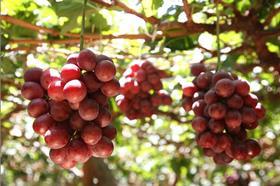
Ramadan this year will pose unique challenges and opportunities for importers and marketers in the predominantly Muslim Asian nation of Malaysia, according to Retna Malar of market consultancy All About Fresh Produce.
Based on lunar movements the timing of its observance changes year to year. This year it will begin on 1 August, whereas five years ago it began on 24 September. “Ramadan has been occurring earlier by an average of 12.8 days over the last seven years,” Mrs Malar pointed out. This means the significant sales window generated by the event is ever shifting, she added.
In previous years US Red Globe grapes were a big seller during the holy month. This year, however, Mrs Malar said Red Globe from the US would not be in the market until midway through the month.
This, however, will provide opportunities for other supply nations, such as Mexico, which had an earlier harvesting time than the US, she said. “Grapes from southern China will also have an advantage as they will have a larger window to drive sales before the American grapes hit the market.”
Other US lines could also benefit from the earlier start to Ramadan, she said.
“Cherries, plums, nectarines and peaches are all expected to be peaking during this time as there is a delay in the harvest this year in the US,” she explained. “The timing could be impeccable for Northwest Cherry Growers to promote cherries as an option for people’s Ramadan menus.”
During the month Muslim consumers will seek sweet fruits to provide sustained energy during the day’s fasting and for breaking fast at sundown. For this reason, sugar content is important and products such as dates always sell well, said Kenneth Wee, director of Total Agri Marketing.
“As time progresses Ramadan has become a sales season and increasingly sweet fruits will be promoted and put on sale to capitalise on this,” he said.
“Dates are still the most preferred item during the month and dates are only offered here during Ramadan, unlike Iran or other Middle Eastern countries where dates are carried practically year round,” he added.
A consumption pattern has emerged in Malaysia over recent years Mrs Malar added, with people buying higher quality produce at the outset of Ramadan before paring back spending as the month progresses. “Trends show that the dates which are of a higher value sell well during the week leading up to the start of Ramadan and continue through for the first two weeks. For the remaining weeks the medium and lower-value dates sell well.”
Increasing opportunities exist for a number of other product lines during the holy month, Mrs Malar added.
“Pakistan mangoes could have an opportunity to make their presence known during the month of fasting as they are very high in energy. The same goes for Bananas, pineapple and melon – either imported or produced locally.”



